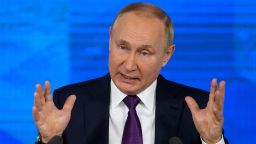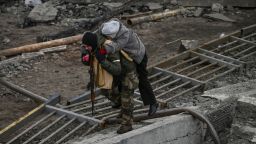Editor’s Note: Frida Ghitis, (@fridaghitis) a former CNN producer and correspondent, is a world affairs columnist. She is a weekly opinion contributor to CNN, a contributing columnist to The Washington Post and a columnist for World Politics Review. The views expressed in this commentary are her own. View more opinion on CNN.
The United States and its NATO allies have thus far tried to prevent a direct confrontation with Russia, but while they may avoid military battle in Ukraine, other clashes are almost certain to follow.
Russian President Vladimir Putin is keenly aware that the West, led by the US, has become the arsenal for Ukraine’s defense against the Russian invasion. That defense has so far turned Putin’s “special military operation” into a humiliating experience for the Russian strongman who, like other authoritarian leaders, doesn’t take well to humiliation.

That’s why there’s a very good chance that Putin will seek to exact revenge on the US.
American intelligence officials believe Putin is now willing to act more aggressively against the US, possibly taking riskier actions toward American democracy. That information comes from interviews by CNN and other news organizations with multiple sources familiar with US intelligence assessments.
The intelligence assessment hasn’t concluded that Putin has made a decision or ordered an operation yet. But the White House has been warning private businesses to bolster their security against Russian hacking. Of course, that’s only one area Russia could attack.
An angry Putin, infuriated by the debacle in Ukraine, is reportedly also lashing out against his own advisers. The investigative group Bellingcat says Putin has carried out a “Stalinist” purge, with more than 100 intelligence officials removed from their jobs in recent days. And there’s little doubt Putin’s also angry with NATO, the US and President Joe Biden himself.
While Putin has many possible targets, perhaps none is more prominent, more inviting and more familiar than a US political system that is in more disarray than at any time in modern memory. America’s bruised democracy, marked by its painfully inflamed political divisions, is ripe for exploitation. Given that Putin has exploited those divisions in the past, it seems increasingly likely he might try do so again.
And political divisions don’t only pit Democrats against Republicans; they are also raging within the Republican Party. In Georgia, for example, supporters of the Big Lie – the false claim that the 2020 election was stolen from former President Donald Trump – heckled Gov. Brian Kemp, a staunch Republican who is facing a primary challenge from a candidate handpicked by the former President.
Putin already interfered in the 2016 election. Multiple investigations, including former special counsel Robert Mueller’s investigation, found Russia interfered in “sweeping and systematic fashion,” seeking to help Trump become president.
Because Trump appears to view mentions of Russian election interference as casting doubt on the legitimacy of his election victory in 2016, he could complicate efforts to warn the American public if Putin launches a campaign to interfere in the 2022 midterms or the 2024 presidential election.
It didn’t help Trump’s cause that only two weeks ago he publicly offered Putin a way to retaliate against Biden, which conveniently suits Trump’s future political ambitions. In an interview with conservative network Just the News, Trump suggested Putin should find dirt about presidential son Hunter Biden’s supposed shady dealings in Russia – a thus far unproven allegation. The request came as Russia was bombarding Ukrainian civilians, prompting international investigations of potential war crimes.
It was a call that echoed Trump’s infamous message in 2016, “Russia, if you’re listening…” – asking Russia to help find then-Democratic presidential candidate Hillary Clinton’s emails. Trump claims that he was just joking, and yet five hours after that, according to the Mueller investigation, hackers working for Russian military intelligence hacked at least over 50 Democratic Party computers, stealing emails that were later released with exquisitely damaging timing for maximum harm to the Clinton campaign.
So, what will Putin do this time?
Lively discussions on the subject are already underway every night on Russia’s state-controlled television channels. Malek Dudakov, a Russian political scientist, recently offered his preferred strategy against the West: “With Europe, economic wars should take priority. With America, we should be working to amplify divisions and … deepen the polarization.”
Evgeny Popov, a Russian state TV host who also happens to be a member of the Duma, Russia’s parliament, declared it time to call on Americans to bring regime change in the US before Biden’s term expires and “again help our partner Trump to become president.”
With Russian television regularly boosting Republican figures, especially Trump, all the while disparaging Biden, some Republicans – particularly the most devoted to the former President – may find it more difficult to reject the Kremlin’s propaganda.
Putin may unsheathe new weapons with which to attack American democracy. But, if he ultimately chooses to interfere in US elections, he will almost certainly bring out his old playbook, which he has deployed in the US and other countries. His operatives and his supporters will likely spread disinformation, unleash cyberattacks and pump up the volume of pro-Putin voices in the US.
As Russia-watchers have been noting, Russian television viewers are getting huge doses of Tucker Carlson and other far-right Americans on their evening programs. Carlson, a Fox News host with high ratings, is returning the favor, amplifying Russian propaganda on his show as recently as last week. It’s a toxic feedback loop of misinformation that serves Putin’s goals in Russia and in the US.
When Russian officials, for example, falsely claimed the US was funding biolabs in Ukraine so that Ukraine could then attack Russia, the White House and others warned this could be the precursor for Russia to use chemical weapons in Ukraine and then blame Kyiv. But, on his show, Carlson repeated the Kremlin’s story. Then Russian television played clips of Carlson on Fox News trying to give credibility to Russia’s lie. With that, the disinformation was spread in the US and solidified in Russia.
In addition to a vigorous response from the American government, there is a role for the American people in defending against another likely assault from Russia. Putin’s troubles in Ukraine call for heightened vigilance and a close scrutiny of information, especially when it echoes Russian propaganda.
Sure, all sides in a conflict try to craft their own narrative, but it is the Kremlin that has the well-established pattern of lying, stoking animosity and spreading disinformation. It seems quite likely Putin will try even harder to turn Americans against each other, seeking revenge over the US helping Ukraine. The current environment in the US makes that seem like an easy victory for Putin, but maybe Americans, after watching Putin’s atrocities in Ukraine, will put up some resistance.


















